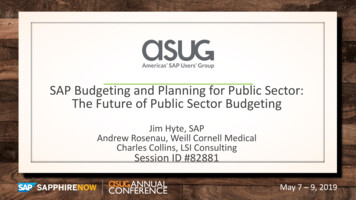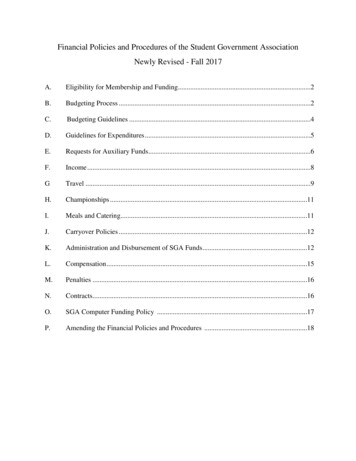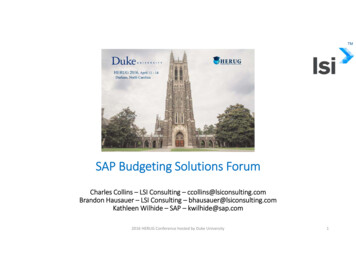
Transcription
Minority Graduate Scholarship Programs2015 Webinar SeriesHow to Make Your Money Work for You:Budgeting & Managing Funding forYour Doctoral DegreePresenters:Dr. Edwin J. Barea-RodriguezProfessor of NeurobiologyChair, Department of BiologyUniversity of Texas at San AntonioDr. Erick C. JonesProfessor, Industrial, Manufacturing & Systems EngineeringUniversity of Texas, ArlingtonManagement services for the Alfred P. SloanMinority Graduate Scholarship Programs provided by
Webinar Presenters Dr. Edwin J. Barea-RodriguezProfessor of NeurobiologyChair, Department of Biology, UTSADirector of Sloan MPHD, MARC andRISE programs 2014 Sloan Mentor of the Year Teaches principles of leadership andfinancial freedom
Webinar Presenters Dr. Erick C. Jones Professor of IndustrialEngineering, UTA Director of RAID and Sloan MPHDprograms Former Alfred P. Sloan MPHD Scholar Fulbright Fellow (Mexico) Advises research students on sponsoredresearch projects; presents at financialplanning seminars
Webinar Outline ObjectivesExpected OutcomesWhy is Funding Important?Types of FundingThe Risks of Losing FundingBudgeting, Savings and Investments as aHedge Against Funding Risks Summary & Questions1
Objectives Identify Available Funding Sources How to Establish a Budget Identify Strategies for Managing FundsMaintaining and Increasing FundingOpportunities2
Expected OutcomesStudents will be able to Identify available funding sources Establish a budget Identify strategies for managing funding Work with faculty to support research3
Why Funding is Important
Why Is Funding Important?Funding Reduces student loan debt Limited ability to get loans Funding is prestigious and looks good ona resume Connection to faculty mentors andadvisors Critical to faculty advising and projectengagement4
Graduate Student ederalRelationsBriefing 1 27 10.pdf5
Graduate Borrowing by FederalRelationsBriefing 1 27 10.pdf6
Graduate Debt SFederalRelationsBriefing 1 27 10.pdf7
Graduate Debt SFederalRelationsBriefing 1 27 10.pdf Average cumulative undergraduate andgraduate debt burden for graduatesDegreeMastersCollective OwingDoctoralCollective OwingAmount of Debt 51,950 22,943,717,500 77,580 3,170,694,600 Debt burden is highest for AfricanAmericans and Hispanics8
What are Some Types of Funding?
Types of Funding Grants Scholarships Fellowships RecruitmentSpecial needsFaculty associated Teaching Assistantships Research Assistantships9
Grants Grants are gifts that you do not need torepay Students may receive grants from the GovernmentPrivate sources of funding Grants may require students to maintainGPA throughout academic career In graduate school, grants can be usedtowards travel, research, experiments orprojects10
Scholarships Scholarships are awards given based onAcademic excellence and/or talent Ethnic background or field of study Financial need Scholarships vary in amounts and number ofyears given aid There is no need to pay back the moneyawardedSources of scholarships are SchoolPrivate funders11
Fellowships There are 3 types: Recruitmentoo Special Needsoo 1st year funding to recruit studentsOnly for one semester or yearCan be associated with college, department orstateHas limited time periodFaculty AssociatedoMay be required that you work with the facultymember12
Fellowships Awarded by private organizations,institutions or through the government tograduate and post-graduate students Based on merit, need and the institution’sor faculty’s grant Awarded by schools to students who havebeen recommended by a faculty member1 to 4 year stipend with or without tuitionwaiver13
Teaching Assistantships Offers students opportunities to learn How to teachTo develop excellent understanding ofcourse materialStudent receives Annual stipend between 6,000 and 15,000Free tuitionExperience in and out of the classroomOpportunity to interact closely with facultymembers14
Teaching Assistantships Duties of the TA vary; expect to beresponsible for Teaching or assisting with one or moresections of a courseRunning laboratory sessionsGrading undergraduate student papers andexamsHolding regular office hours and meetingwith studentsConducting study and review sessions15
Research Assistantships Why become a Research Assistant? What Does a Research Assistant Do? How to get involved as ResearchAssistant Benefits for Faculty16
What are the Risks of LosingFunding?17
Risks of Losing Funding Not meeting renewal guidelinesor performance requirements GPAPublication recordTeaching reviews Agency program ending Changing faculty researchers Voluntarily and involuntarily17
Budgeting, Saving and Investing asa Hedge Against Funding Risks
Hedging Against Fund Risks Basics of BudgetingSaving for a Bad SemesterInvestmentCommon mistakes18
Budget Basics Develop a theoretical budget vs a realbudget (spending plan) Zero based budgeting All expenses must be justified every monthUnderstand the difference between yourmonthly budget and the Sloan spendingplan Your budget is how you will spend yourmoneyThe Sloan spending plan is how Sloan willdistribute your scholarship funds20
Quickie BudgetEarnings/Income Per MonthSalary # 1 (net take-home)Salary # 2 (net take-home)Other (less taxes)Total Monthly Income1. GivingContributions2. Saving (Guide: 5-10%)EmergencyReplacementLong Term3. Debt (Guide: 0-10%)Credit Cards:VISAMastercardDiscoverAmerican ExpressGas CardsDepartment StoresEducation LoansOther Loans:Bank LoansCredit UnionFamily/FriendsOther4. Housing (Guide: ectricGasWaterTrashTelephone/InternetCable TVOther5. Auto/Transp. (Guide: 12-15%)Car PaymentsGas & Bus/Train/ParkingOil/Lube/Maintenance6. Insurance (Guide: 5%)(Paid by 100 1507. Household/Personal (Guide: 15-25%) 250Groceries200Clothes/Dry CleaningGiftsHousehold tyOther:Books/MagazinesAllowances-Personal TechnologyEducationPetsMiscellaneous8. Entertainment (Guide: 5-10%)Going Out:MealsMovies/EventsBaby-sittingTravel (Vacations/Trips)Other:Fitness/SportsHobbiesMedia RentalOther (Sloan expenses)9. Prof. Services (Guide: 5-15%)Child ssional Dues10. Miscellaneous (Guide: 2-3%)Small Cash ExpendituresTOTAL EXPENSESTotal Monthly IncomeLess Total ExpensesIncome Over/(Under) Expenses1306050205004004008585 3,745 2,800 3,745( 945)21
22
Saving for a Bad Semester A common budgeting mistake forgraduate students Not planning on losing fundingooooLoss of stipend or parental support1-year stipend or fellowship endsUnplanned expenses Babies Car accidentsLife happens23
Saving for a Bad Semester Make saving a habit. Rule of thumb: Save one semester of fundingExample: stipend 1500/monthSemester 5 monthsYou should save 1500 x 5 7500Generally you can live off a half of yourincome in an emergency You should at least save 1500 x 2.5 325024
Saving for a Bad Semester Strategies for saving Apply for multiple sources of funding for theyearPay yourself firsto Cover expenses with assistantship onlyo Put 10% of your funding into a savings accountuntil you reach your emergency goal amountsave your 1-year fellowships, scholarships andother short-term fundsUnderstand your tax situationooEstimate your tax refundAdjust withholding accordingly25
Investment Pay off all debt before investing Best investment is to reduce credit card debt Avoid risky investments Do not invest in stocks, gold, etc. Yourmoney is easily lostInvest in short-term/liquid instrumentsooooBank savings accountShort-term certificates of deposit (up to 1-year)There are fees associated with liquidatinginstruments before maturity dateStagger maturity dates of short term CDs so onematures every semester26
Common Mistakes Not saving for emergenciesLosing money in risky investmentsIncurring a lot of school debtNot understanding the differencesbetween funding sources Changing or not changing advisorswithout considering funding27
Summary Weigh benefits of different types offunding Link to research faculty Stack your funding Apply to multiple sourceso Be aware of conflicts Graduate with minimal debt28
Action Planhttps://www.daveramsey.com/new/baby-steps/36
Baby Step 1 1,000 to start an Emergency Fund An emergency fund is for those unexpectedevents in life that you can’t plan for: the lossof a job, an unexpected pregnancy, a faulty cartransmission, and the list goes on and on. It’snot a matter of if these events will happen; it’ssimply a matter of when they will happen.
Baby Step 2Pay off all debt using the Debt Snowball List your debts, excluding the house, in order.The smallest balance should be your numberone priority. Don’t worry about interest ratesunless two debts have similar payoffs. If that’sthe case, then list the higher interest rate debtfirst.
Baby Step 33 to 6 months of expenses in savings Once you complete the first two baby steps,you will have built serious momentum. Butdon’t start throwing all your “extra” moneyinto investments quite yet. It’s time to buildyour full emergency fund.
Baby Step 4Invest 15% of household income into RothIRAs and pre-tax retirement When you reach this step, you’ll have nopayments—except the house—and a fullyfunded emergency fund. Now it’s time to getserious about building wealth.
Baby Step 5College funding for children By this point, you should have already startedBaby Step 4—investing 15% of your income—before saving for college. Whether you aresaving for you or your child to go to college,you need to start now.
Baby Step 6Pay off home early Now it’s time to begin chunking all of yourextra money toward the mortgage. You aregetting closer to realizing the dream of a lifewith no house payments.
Baby Step 7Build wealth and give! It’s time to build wealth and give like neverbefore. Leave an inheritance for futuregenerations, and bless others now with yourexcess. It's really the only way to live!
Contacts:Dr. Edwin J. Barea-RodriguezChair, Department of BiologyUniversity of Texas at San Antonioedwin.barea@utsa.eduDr. Erick C. JonesProfessor, Industrial, Manufacturing & Systems EngineeringUniversity of Texas, Arlingtonecjones@uta.eduDenise EllisProgram ManagerAlfred P. Sloan Minority Graduate Scholarship ProgramsNational Action Council for Minorities in Engineering, Inc.sloanphds@nacme.org
Your Doctoral Degree . . Department of Biology . University of Texas at San Antonio . Dr. Erick C. Jones . Professor, Industrial, Manufacturing & Systems Engineering . University of Texas, Arlington . Webinar Presenters Dr. Edwin J. Barea-Rodriguez Professor of Neurobiology Chair, Department of Biolog











